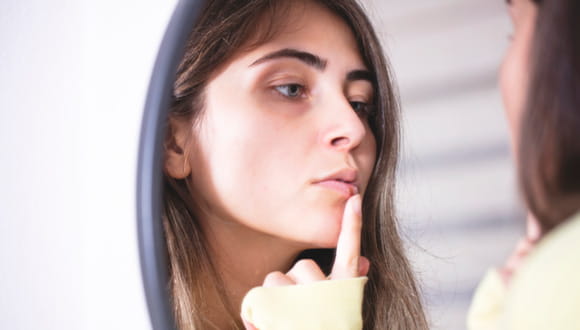How Can I Get Rid of Cold Sores Quickly?
Feb. 25, 2020 - Katie McCallumThey're painful. They're unsightly. They're annoying. Cold sores (aka fever blisters) are just plain unwelcome. When one pops up on your lip or mouth, you probably immediately think: What's the fastest way to get rid of this thing?
"Herpes simplex virus — the virus that causes cold sores — is incredibly contagious, and infection with the virus is really common," says Dr. Donald Brown, primary care practitioner at Houston Methodist. "In fact, more than 50% of adults in the U.S. are infected with the type of herpes virus that most commonly causes cold sores. Interestingly, however, most people who contract the virus never actually develop symptoms."
If the virus does cause cold sores, it can spread from person-to-person through close contact, like kissing. But, while you may not know it, the virus can also spread by sharing:
- Cosmetics
- Food and drink
- Lip balm
- Razors
- Toothbrushes
- Towels
- Utensils and drinking glasses
"The virus is most contagious when a cold sore is present, particularly when the blister begins to ooze," Dr. Brown adds. "However, it's important to know that you can still spread the virus long after a cold sore heals — as well as when a blister isn't even present."
For those who are no stranger to those painful, fluid-filled blisters, when you get a cold sore, you probably want it gone — fast.
What are the best ways to get rid of a cold sore?
Unfortunately, there's no cure for cold sores, and it can take between two to four weeks for a cold sore to heal on its own. But, there are things you can do to make them go away faster.
Here are three things that can help soothe a cold sore or make it clear up faster:
1. Try home remedies. When used early, there are several remedies that can help ease the pain and reduce swelling — and may even shorten the duration of a cold sore:
- Cold, damp washcloth
- Ice or cold compress
- Petroleum jelly
- Pain relievers, such as ibuprofen and acetaminophen
2. Apply topical creams and ointments. There are a few over-the-counter anesthetic ointments and creams that can help control pain, such as lidocaine or benzocaine. Some products, such as those containing docosanol or benzyl alcohol, may even promote faster healing when used early and in plentiful amounts.
3. Take prescription medications. There are antiviral drugs that can help cold sores heal faster, including acyclovir, valacyclovir, famciclovir and penciclovir. If you're having frequent outbreaks or experiencing some of the serious side effects of having a cold sore, your doctor may consider prescribing antiviral medication.
"To get rid of a cold sore quickly, the best thing you can do is start treating it as soon as possible," says Dr. Brown. "A burning or tingling sensation on your lips or face can be an early warning sign that a cold sore is developing, and the earlier you start reducing swelling and treating the cold sore, the faster it will heal."
How can I stop cold sores from forming?
So you nipped your last cold sore flare-up in the bud (like a champ), and it lasted less than a week — but here you are, just a few months later, and the cold sores are back. There's good news, and then there's bad news. Let's start with the bad news.
"Once a person is infected with herpes simplex virus, he or she is infected for life," says Dr. Brown. "After a cold sore heals, the virus isn't actually cleared from your body. Instead, the virus travels back into your nerves, where it can lie dormant for long periods of time. When the virus reemerges, it typically does so in the same spot as before."
So what triggers the virus to reactivate and cause a flare-up?
Dr. Brown says that a cold sore outbreak can be triggered by:
- Fever
- Illness, including a cold
- Menstruation
- Stress
- Sunlight
- Weakened immune system
But, here's the good news. While there's not much you can do about some of these triggers, others can be avoided.
"Stress can weaken your immune system, which may be a trigger for cold sores to reemerge. If you suffer from cold sores and think they may be caused by stress, it's a good idea to manage your stress via mediation or other relaxation techniques," suggests Dr. Brown. "If you've noticed that your flare-ups are linked to sunlight, be sure to apply sunscreen or sun-protective lip balm before going out in the sun."
Need care now?
Houston Methodist Virtual Urgent Care offers on-demand video visits from wherever you are, no appointment needed. Our board-certified providers are available 24/7 to address many common health issues.








